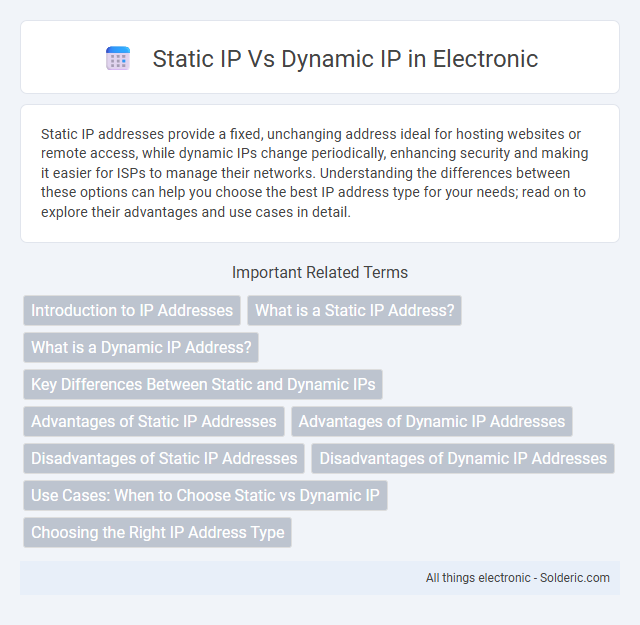Static IP addresses provide a fixed, unchanging address ideal for hosting websites or remote access, while dynamic IPs change periodically, enhancing security and making it easier for ISPs to manage their networks. Understanding the differences between these options can help you choose the best IP address type for your needs; read on to explore their advantages and use cases in detail.
Comparison Table
| Feature | Static IP | Dynamic IP |
|---|---|---|
| Definition | Permanent IP address assigned to a device | Temporary IP address assigned by DHCP |
| IP Address Change | Never changes unless manually updated | Changes periodically or on each connection |
| Use Case | Servers, hosting, remote access | Home users, general internet access |
| Configuration | Manually configured | Automatically assigned |
| Cost | Typically higher cost from ISP | Usually free with ISP service |
| Reliability | More reliable for consistent connection | Less reliable for fixed location services |
| Security | Higher risk if exposed to public internet | Lower risk due to IP changing over time |
| Example | Web server hosting 24/7 | Home Wi-Fi network using ISP DHCP |
Introduction to IP Addresses
IP addresses are unique numerical labels assigned to each device connected to a network, enabling identification and communication. Static IP addresses remain constant, providing a fixed address for reliable access, while Dynamic IP addresses are assigned temporarily by a DHCP server and can change over time. Understanding the difference helps you manage network settings effectively for various applications like hosting servers or ensuring privacy.
What is a Static IP Address?
A static IP address is a fixed numerical label assigned to a device on a network, remaining constant over time for reliable identification and communication. This permanence allows for easier hosting of servers, remote access, and consistent device management without the need for frequent IP address changes. You benefit from a static IP when stability and uninterrupted connectivity are crucial to your network operations.
What is a Dynamic IP Address?
A dynamic IP address is a temporary numerical label assigned to a device by a network's DHCP server, allowing it to connect to the internet or local network without a fixed identity. These IP addresses change periodically or when the device reconnects, enhancing security and efficient IP address management. Dynamic IPs are commonly used by ISPs for residential and mobile users due to their flexibility and scalability.
Key Differences Between Static and Dynamic IPs
Static IP addresses remain constant and are manually assigned, ensuring consistent access for hosting websites or remote servers, while dynamic IP addresses are automatically allocated by a DHCP server and can change periodically. Static IPs provide stability and better control for network management, whereas dynamic IPs offer enhanced security and efficient IP address allocation for general users. Understanding these key differences helps you choose the right IP type based on your specific networking needs.
Advantages of Static IP Addresses
Static IP addresses provide consistent and reliable connectivity essential for hosting servers, websites, and remote access applications. Their fixed nature improves network stability, eases troubleshooting, and enhances security by enabling easier implementation of firewall rules and VPN configurations. You benefit from uninterrupted service and simplified management, especially crucial for businesses requiring dependable communication channels.
Advantages of Dynamic IP Addresses
Dynamic IP addresses offer enhanced security benefits by frequently changing, making unauthorized tracking and hacking attempts more difficult. They reduce the need for manual configuration, simplifying network management and lowering costs for Internet Service Providers. Your device can seamlessly connect to different networks, allowing for increased flexibility and ease of access in various locations.
Disadvantages of Static IP Addresses
Static IP addresses can lead to higher security risks as they are more vulnerable to targeted cyberattacks due to their fixed nature. They require manual configuration and maintenance, increasing administrative overhead and the potential for human error. Limited flexibility makes scaling networks or accommodating changing IP needs more challenging compared to dynamic IPs.
Disadvantages of Dynamic IP Addresses
Dynamic IP addresses can cause issues with consistent remote access because they change periodically, disrupting services like VPNs or hosting servers. This variability complicates network management and troubleshooting by requiring frequent updates to DNS records or access controls. Your devices may also face increased security risks since dynamic IPs are often targeted for unauthorized access due to their transient nature and lack of fixed identification.
Use Cases: When to Choose Static vs Dynamic IP
Static IP addresses are ideal for hosting servers, remote access, and running services requiring consistent connectivity, such as websites, email servers, or VPNs. Dynamic IPs suit everyday internet users, providing cost-effective and secure solutions for casual browsing, streaming, and general device connectivity. Businesses requiring stable network configurations and reliable access often opt for static IPs, while dynamic IPs benefit environments with frequent device changes or enhanced privacy needs.
Choosing the Right IP Address Type
Choosing the right IP address type depends on your network needs and device roles; static IP addresses offer consistent, unchanging identification ideal for servers, printers, and remote access, enhancing reliability and ease of management. Dynamic IP addresses, assigned by DHCP servers, provide flexibility and efficient IP address allocation for general users and devices with changing network connections. Businesses requiring stable connections and custom configurations benefit from static IPs, while residential users and mobile devices typically function well with dynamic IPs.
Static IP vs Dynamic IP Infographic

 solderic.com
solderic.com